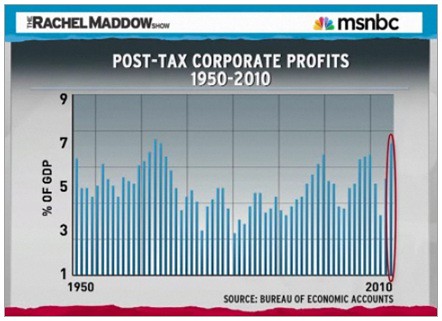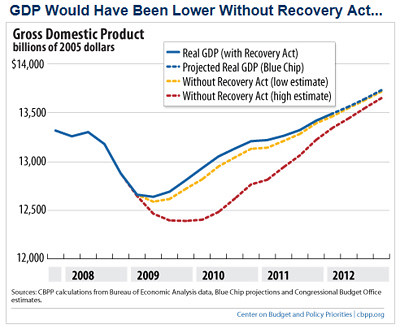Romney's Big Lie on the Economy Now Bigger than Ever
If nothing else, you have to admire Mitt Romney's persistence. After he formally announced his candidacy a year ago by declaring when President Obama "took office, the economy was in recession, and he made it worse, and he made it last longer," fact checkers quickly demolished Romney's obvious falsehood. But despite his subsequent denial just days later that "I didn't say that things are worse," Governor Romney has never stopped regurgitating some version of his "Obama made the economy worse" lie.
Now in advance of the President's major address on the economy Thursday in Cleveland, Mitt Romney is back with a new formulation of his fraud. Unfortunately for Romney, the facts and the overwhelming consensus of economists - including the nonpartisan Congressional Budget Office and John McCain's 2008 brain trust - flatly contradict Mitt's slander Wednesday that Obama "is not responsible for whatever improvement we might be seeing, instead he is responsible for the fact that it's taken so long to see this recovery and the recovery is so tepid." Instead, they insist, President Obama saved the American free-enterprise system from the abyss and averted Great Depression 2.0.
The data are straightforward. Barack Obama entered office in 2009 as the Bush recession was in full swing. GDP had plummeted by a shocking 8.9 percent the previous quarter. 820,000 jobs were lost in January 2009 alone; all told 2.2 million evaporated in the three months before Obama's stimulus was passed in February. (That might explain why even three years after he left office, Americans still blame George W. Bush for the economic calamity he bequeathed to Barack Obama.) Now, even with the difficult recovery, the U.S. has produced 27 months of private sector job gains and a return to economic growth. And despite Romney's charge that President Obama's are "the most anti-investment, anti-business, anti-jobs series of polices in modern American history," the Dow Jones has jumped by 56 percent since January 20, 2009. Corporate profits are at record highs even as firms' tax burden continues to drop.
Nevertheless, Governor Romney told a Missouri audience last week that that the President "slowed the recovery and harmed our economy," a result Romney insisted constituted "a moral failure of tragic proportions." Sadly for his campaign's mythmaking, just 24 hours earlier, the director of the nonpartisan Congressional Budget Office blew the Romney's bogus claim out of the water.
As the Washington Post reported, the House Budget Committee heard testimony from CBO Director Douglas Elmendorf to answer simple question: did the $787 billion Obama stimulus work? Unfortunately for Republican propagandists, Elmendorf clearly refuted Mitt Romney's claim that the American Recovery and Reinvestment Act (ARRA) was "the largest one-time careless expenditure of government money in American history."
Under questioning from skeptical Republicans, the director of the nonpartisan (and widely respected) Congressional Budget Office was emphatic about the value of the 2009 stimulus. And, he said, the vast majority of economists agree.
In a survey conducted by the University of Chicago Booth School of Business, 80 percent of economic experts agreed that, because of the stimulus, the U.S. unemployment rate was lower at the end of 2010 than it would have been otherwise.
"Only 4 percent disagreed or strongly disagreed," CBO Director Douglas Elmendorf told the House Budget Committee. "That," he added, "is a distinct minority."
Not content with that response, Kansas Republican Rep. Tim Huelskamp tried again. "Where did Washington mess up?" Huelskamp demanded. "Because you're saying most economists think it should've worked. It didn't." As the Post's Lori Montgomery detailed, Elmendorf drove home the point:
Most economists not only think it should have worked; they think it did work, Elmendorf replied. CBO's own analysis found that the package added as many as 3.3 million jobs to the economy during the second quarter of 2010, and may have prevented the nation from lapsing back into recession.
Elmendorf's agency released its latest assessment of the stimulus just last week. And as the table below shows, at its peak in 2010 the ARRA added up to 3.3 million jobs, cut unemployment by as much as 1.8 percent and boosted GDP by up to 4.1 percent. (It's also worth noting that the CBO once again confirmed that aid to the states and purchases by the federal government delivers the biggest bang for the buck, while upper income tax cuts provide the least.)
Still, the Romney campaign remains determined to whitewash that message. As one Romney aide described President Obama's stimulus program, "He spent $800 billion of everybody's money. How'd it work out?"
As it turns out, it worked pretty well.
Sadly for the myth makers of Team Romney, the facts and the overwhelming consensus of economists - including John McCain's 2008 brain trust - prove otherwise. President Obama not only did not make the American economy worse; no thanks to obstructionist Republicans in Congress he saved the United States from "Great Depression 2.0" and put the nation on the path to recovery.
The proof starts, but certainly doesn't end with the Congressional Budget Office (CBO). Despite Republican mythmaking that the American Recovery and Reinvestment Act (ARRA) "created zero jobs," in November the CBO reported that the stimulus added up to 2.4 million jobs and boosted GDP by as much as 1.9 points in the previous quarter. As The Hill explained, the CBO has found that "President Obama's 2009 stimulus package continues to benefit the struggling economy":
The agency said the measure raised gross domestic product by between 0.3 and 1.9 percent in the third quarter of 2011, which ended Sept. 30. The Commerce Department said Tuesday that GDP in that quarter was only 2 percent total...
By CBO's numbers, the $800 billion stimulus added up to 0.9 million jobs in 2009, 3.3 million jobs in 2010 and 2.6 million jobs in 2011.
In February, the New York Times assessed the impact of the Obama stimulus and rebutted its Republican critics who looked instead to the UK for inspiration:
By comparison, despite criticism of its size and composition by both the right and the left, the stimulus by the Obama administration did add to jobs and growth. The nonpartisan Congressional Budget Office estimates it will have contributed at least 1.6 million jobs and perhaps as many as 8.4 million by 2013.
This month, the Booth School of Business at the University of Chicago surveyed a panel of economic experts of different political persuasions about the impact of the president's stimulus package: eight out of 10 said it had contributed to lower unemployment by the end of 2010. There was less consensus on whether its benefits would exceed its long-term costs, including higher taxes to pay for the spending. Still, when asked if the policy was worth it, four times as many economists agreed as disagreed.
Among those economists is Mark Zandi, who in 2008 served as an adviser to Republican John McCain. Federal intervention, he and Princeton economist Alan Blinder argued in August 2010, literally saved the United States from a second Great Depression. In "How the Great Recession Was Brought to an End," Blinder and Zandi's models confirmed the impact of the Obama recovery program and concluded that "laissez faire was not an option":
The effects of the fiscal stimulus alone appear very substantial, raising 2010 real GDP by about 3.4%, holding the unemployment rate about 1½ percentage points lower, and adding almost 2.7 million jobs to U.S. payrolls. These estimates of the fiscal impact are broadly consistent with those made by the CBO and the Obama administration.
But their modeling also suggests that the totality of federal efforts to rescue the banking system dating back to the fall of 2008 prevented a catastrophic collapse:
We find that its effects on real GDP, jobs, and inflation are huge, and probably averted what could have been called Great Depression 2.0. For example, we estimate that, without the government's response, GDP in 2010 would be about 11.5% lower, payroll employment would be less by some 8½ million jobs, and the nation would now be experiencing deflation.
Even Douglas Holtz-Eakin, former head of the CBO and chief economic adviser to John McCain during the 2008 election, acknowledged the impact of the stimulus. Certainly no fan of either Barack Obama or the design of the ARRA, Holtz-Eakin told Ezra Klein that:
"The argument that the stimulus had zero impact and we shouldn't have done it is intellectually dishonest or wrong. If you throw a trillion dollars at the economy it has an impact, and we needed to do something."
Lamentably, we still need to do something. As May's disappointing jobs numbers show, the slowdown in China and the deepening crisis in Europe are already having an impact in the U.S. But the same Senate Republicans who gave the February 2009 stimulus bill only three votes filibustered President Obama's proposed $447 billion American Jobs Act last October. Nine days later, the GOP blocked $35 billion in aid to states to pay the salaries of teachers, firefighters and police. (Forecasters estimated the AJA stymied by the Republicans could have added up to 1.3 million jobs and 2 points to GDP this year. Nevertheless, Mitt Romney charged on Tuesday that Obama "hasn't put forth a plan to get us working again."
As it turns out, the 600,000 jobs shed by state and local governments since December 2008 not only added as much a full point to the unemployment rate, but meant "the current recovery is the only one that has seen public-sector losses over its first 31 months." Despite that "anti-stimulus," Mitt Romney pretended once again last week that "President Obama has expanded government."
No, President Obama has not expanded government. He has not "made the economy worse." And while Mitt Romney never tires of saying it, that doesn't make his Big Lie any more true.







